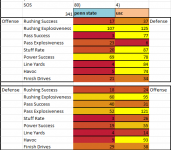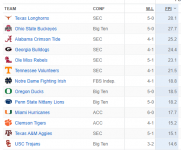If the spread is PSU giving five, how is USC, Espn ranked 52% likely to win?
- Thread starter Mr. Potter
- Start date
You are using an out of date browser. It may not display this or other websites correctly.
You should upgrade or use an alternative browser.
You should upgrade or use an alternative browser.
I'm sure ESPN has their own analytics program, similar to SP+ and others, which is indicating an edge on USC. That has no bearing on the spread as I doubt any sharp bettor or bookmaker is using it. Strength of schedule could play into it, which is adv to USC.Wouldn't USC give points. Math Guys or Gamblers please enlighten.
Shalom
Exactly. I'm sure that their FPI feeds into it somewhat since that has PSU a little lower, and USC a little higher, than in other power ratings...but even that wouldn't get them all the way to being a favorite unless HFA is a bit inflated.I'm sure ESPN has their own analytics program, similar to SP+ and others, which is indicating an edge on USC. That has no bearing on the spread as I doubt any sharp bettor or bookmaker is using it. Strength of schedule could play into it, which is adv to USC.
Good point on HFA. FPI has PSU as 5 points better on a neutral, so not sure how ESPN is making up that difference. collegefootballdata shows PSU with a lot of stat advantages.Exactly. I'm sure that their FPI feeds into it somewhat since that has PSU a little lower, and USC a little higher, than in other power ratings...but even that wouldn't get them all the way to being a favorite unless HFA is a bit inflated.

Easy one...the Mushmouf upset alert factorFPI has PSU as 5 points better on a neutral, so not sure how ESPN is making up that difference.
Perhaps the ESPN folks that set these things also watch James Franklin coached PSU teams struggle on the road against good teams?Wouldn't USC give points. Math Guys or Gamblers please enlighten.
Shalom
I have to think the algorithm captures road performance vs teams with a pulse. This one feels like a toss up given PSU’s form against Illinois and UCLA. It’s not a stretch to think they will lose their first real road test across the country.
Gelt geyt tsu geltWouldn't USC give points. Math Guys or Gamblers please enlighten.
Shalom
There is zero chance that this would play into it...they are putting data into a computer and spitting out a result.Perhaps the ESPN folks that set these things also watch James Franklin coached PSU teams struggle on the road against good teams?
I have to think the algorithm captures road performance vs teams with a pulse. This one feels like a toss up given PSU’s form against Illinois and UCLA. It’s not a stretch to think they will lose their first real road test across the country.
I don't think there is human element to it. I think it's purely analytics driven, so I would be surprised if they are factoring in JF or road struggles. While PSUs performances vs Illy and UCLA may not be great, USC lost to a very average Michigan (that could hardly complete a forward pass) and Minny.Perhaps the ESPN folks that set these things also watch James Franklin coached PSU teams struggle on the road against good teams?
I have to think the algorithm captures road performance vs teams with a pulse. This one feels like a toss up given PSU’s form against Illinois and UCLA. It’s not a stretch to think they will lose their first real road test across the country.
This might be my most favorite misconception in the worldA point spread is a point where the better public is equally likely to place money on both sides of the bet. It is a subjective estimate of the subjective/emotional opinions of those willing to place a bet.
That brings me back to sixth grade headaches.A point spread is a point where the better public is equally likely to place money on both sides of the bet. It is a subjective estimate of the subjective/emotional opinions of those willing to place a bet.
Another thing to consider is Penn State's propensity for slow starts. It's one thing to recover from these at home. It would be quite another against the likes of USC on the road. Hopefully, this won't happen again on Saturday.
Fair. Wouldn’t the road struggles show up in the data and thus the algorithm? USC doesn’t scare me. But these slow starts will catch up with them if they continue. You let enough teams with talent hang around and you’ll get beat at some point.I don't think there is human element to it. I think it's purely analytics driven, so I would be surprised if they are factoring in JF or road struggles. While PSUs performances vs Illy and UCLA may not be great, USC lost to a very average Michigan (that could hardly complete a forward pass) and Minny.
My guess is that ESPN takes the difference between the FPI (3.6 points in favor of PSU), adjusts it for HFA (so maybe 1-1.5 points in favor of PSU) and then adjusts for some stat comparisons between the two teams to get a point spread that is a few points in favor of USC. You can use a point spread to correlate to a % chance of winning. I doubt they factor in any sort of non-quantifiable/emotional factors. That is what human handicappers do. Not to mention, PSU has playedFair. Wouldn’t the road struggles show up in the data and thus the algorithm? USC doesn’t scare me. But these slow starts will catch up with them if they continue. You let enough teams with talent hang around and you’ll get beat at some point.

Last edited:
Again, this is a computer projection. It is not factoring in slow starts, which aren't going to be measured in a computer statistic.Another thing to consider is Penn State's propensity for slow starts. It's one thing to recover from these at home. It would be quite another against the likes of USC on the road. Hopefully, this won't happen again on Saturday.
Understand you on this. In the previous post you mention two road games. I think you were referring to Illinois as one of those? That was a home game (21-7).Again, this is a computer projection. It is not factoring in slow starts, which aren't going to be measured in a computer statistic.
Oops, you're right. So, PSU has only had 1 road game where it looked pretty dominant for much of it.Understand you on this. In the previous post you mention two road games. I think you were referring to Illinois as one of those? That was a home game (21-7).
4
Yep. Relatively quick start in that one.Oops, you're right. So, PSU has only had 1 road game where it looked pretty dominant for much of it.